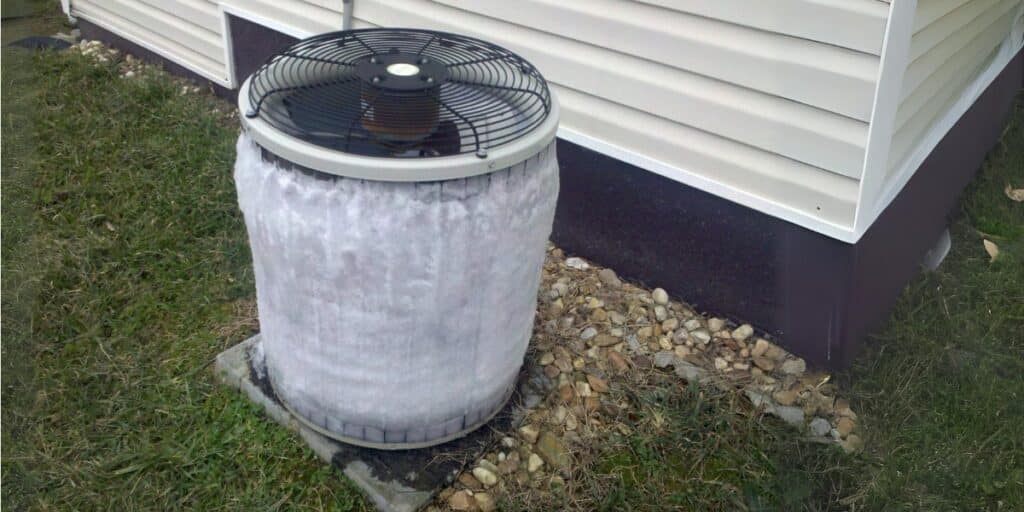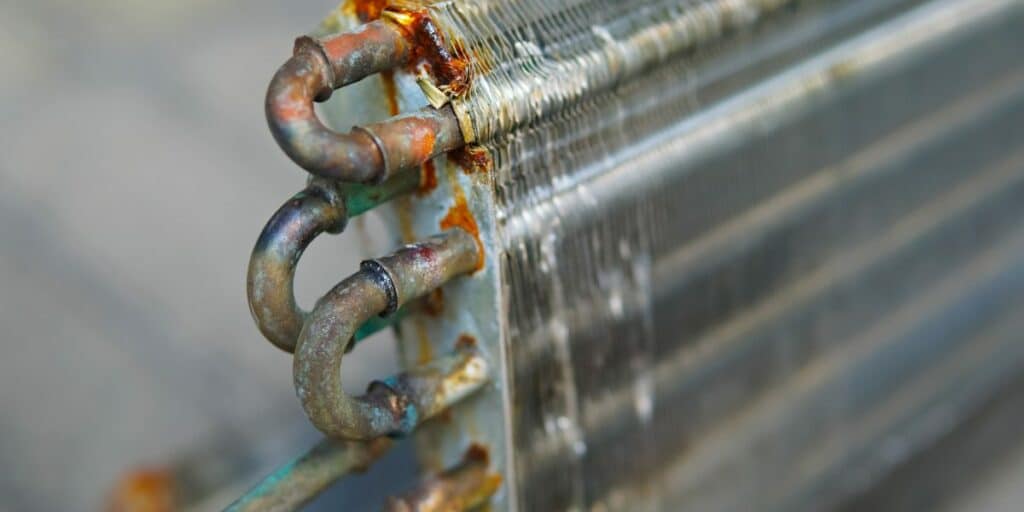When your air conditioner transitions from being a source of cool air to resembling a block of ice, it’s natural to feel slightly alarmed. However, there’s usually no need for immediate concern. Many times, unfreezing an AC unit is a straightforward process that you can handle yourself. This guide is designed to help you diagnose and address a frozen AC unit, enabling you to determine whether it’s a job for a DIY enthusiast or if it’s time to call in a professional.
Freezing issues can plague both indoor and outdoor AC units. It’s crucial to address this problem early because if left unchecked, the cost of repairs can skyrocket.
For example, if the evaporator coils within your AC unit remain frozen for an extended period, they risk cracking or breaking. And the repair costs ranging from $750 to $2,500. Understanding how to efficiently and quickly unfreeze your AC unit is a matter of convenience and a significant financial consideration. In essence, the quicker you act, the more time and money you save in the long run.
Let’s delve into the steps to defrost your AC unit and prevent future freeze-ups.
Identifying a Frozen AC Unit
Catching a frozen AC unit early is important to avoid serious damage and costly repairs. The most obvious sign is visible ice on any part of your HVAC system, but there are other indicators to look out for.

One of the key symptoms of a frozen AC unit is your AC isn’t blowing cool air. Normally, an air conditioner sends a steady flow of cool air through the vents. But if you feel warm air instead, it could mean ice is forming in the system, often due to a frozen evaporator coil.
Also, listen for unusual sounds. A hissing noise from your AC unit is a bad sign. It could mean ice inside the system or a refrigerant leak – a common cause of freezing that can seriously damage your AC.
Visible ice, warm air instead of cool, and hissing noises are signs your AC unit may be frozen. Spotting these early and acting quickly can save your AC from more damage and decrease repair costs. Your wallet will thank you for noticing these signs early.
How to Fix a Frozen AC
Dealing with a frozen AC unit can be daunting, but understanding the right steps can make the process smoother and more effective. Here’s a guide to help you address the issue based on common causes:
Step 1. Turn Off the AC
As soon as you realize your AC is frozen, the first and most crucial step is to turn it off. Continuing to operate a frozen unit can lead to more severe damage. Begin by switching off the control panel of the unit. Additionally, for extra safety and to ensure the unit doesn’t turn back on by itself, locate and turn off the circuit breaker connected to the AC.
With the system off, allow time for all the ice on the unit to thaw completely. This process can take up to 24 hours. While there are methods to expedite the thawing, avoid trying to chip off the ice manually, as this can cause damage to the system.
Step 2. Start the Fan to Help Thaw the Unit
If the outdoor temperature is well above freezing, you can use the fan-only setting of your system to aid in thawing and drying the coils. Ensure you select the manual fan setting, not the automatic. Let the fan run as long as necessary to thaw the coils completely. During this time, observe any issues with airflow or condensation, especially while the cool setting is off.
Step 3. Post-Thawing Checks
After your unit has completely thawed, you need to check the following:
Check the Air Filters
After the ice has melted, reopen the unit and examine the air filters. Dirty filters can significantly impact airflow, leading to freezing issues. A clean and effective air filter should appear visually clean. Even a slight layer of dirt or dust can reduce airflow and contribute to freezing problems.
Replace any dirty filters with new ones, then restart the system to see if the issue is resolved. Let it run for a few days, watching for any signs of freezing. If the problem persists, it’s time to move on to the next step.
Examine the Evaporator Coils
If changing the air filter doesn’t resolve the issue, the next step is to inspect the evaporator coils with the unit turned off. Dirty or clogged coils can be another culprit behind freezing. If you notice dirt or blockage on the evaporator coils, carefully clean them yourself or call a professional if the task seems too complex.

By following these steps, you can effectively address the issue of a frozen AC unit.
However, if the problem continues despite your efforts, it may be time to consult a professional HVAC technician. Several complex problems could be causing the freezing, which are not always apparent or easy to fix.
Common Causes of a Frozen AC Unit
Understanding the potential causes of a frozen AC unit can help you identify and address the issue more effectively. While some causes are relatively simple to fix, others are more complex and may require professional intervention.
- Low Refrigerant
Low refrigerant levels can be a primary cause of a frozen AC unit. When the refrigerant level is too low, the pressure in the system decreases, slowing down the refrigerant’s flow. This reduced speed means the refrigerant stays in the cooling cycle for too long, making it excessively cold when it reaches the evaporator coils. This over-cooling can result in the formation of ice on the coils. - Broken Mechanical Parts
An AC unit functions on various mechanical components. If any of these parts, such as the fan, fail, it can disrupt the unit’s pressure balance and cause freezing issues. These mechanical failures can lead to inefficiencies in the cooling process and eventual ice formation. - Insufficient Airflow
Another common cause is inadequate airflow, which can be due to several factors. A dirty air filter or clogged coils can significantly impede airflow. Additionally, a malfunctioning fan can fail to circulate air properly. When the airflow is restricted, the AC unit can’t draw enough warm air from the home into the system, leading to the condensation on the coils freezing. - Cold Outdoor Temperatures
Operating an AC unit in cold outdoor conditions can also lead to freezing. When the outdoor temperature is low, it can affect the refrigerant pressure within the system. This pressure drop can cause the refrigerant to become too cold, leading to ice build-up on the unit.
Understanding these causes can help you effectively diagnose and address your AC unit’s freezing problem.
How to Prevent an AC Unit From Freezing
Maintaining and preventing your AC unit from freezing involves some straightforward yet essential steps. These measures can ensure your unit operates efficiently throughout the year, particularly during colder weather.
1# Replace the Filter Regularly
One of the simplest ways to prevent your AC unit from freezing is by regularly replacing or cleaning the air filters. A dirty filter can drastically reduce airflow, leading to freezing issues. Most air filters must be replaced every one to three months, which can vary depending on the unit and usage. Always refer to the manufacturer’s recommendations for your particular AC system to determine the optimal replacement frequency.
2# Remove Vent and Duct Obstructions
Periodically check the vents and ducts of your AC unit to ensure they are not obstructed. Common household items like heavy rugs or pet beds can block these airways, reducing airflow and increasing the risk of freezing. Keeping vents and ducts clear is an easy way to maintain proper airflow through your system.
3# Don’t Run the Unit at Low Temperatures
Operating your AC unit when the outdoor temperature is below 60 degrees Fahrenheit can lead to freezing. To avoid this, it’s advisable to use a programmable thermostat. This device can automatically turn off the AC when the ambient temperature reaches a set point, preventing the unit from running in conditions that could lead to freezing.
4# Schedule Regular Maintenance
Regular professional maintenance is key to the health of your AC unit. Ideally, have a local HVAC technician inspect your system at least once a year, preferably in early spring, before the onset of warm weather. A fall inspection is also advisable to prepare for the temperature drop, especially for combined heating and cooling systems.
Following these steps can significantly reduce the risk of your AC unit freezing. Regular maintenance, both DIY and professional and mindful operation, can keep your system running smoothly and efficiently, minimizing the likelihood of unexpected breakdowns and freezing problems.
FAQs Section
Will a frozen AC fix itself?
A common question among homeowners dealing with a frozen AC unit: will it fix itself?
While the issue might be resolved independently, adopting a ‘wait and see’ approach is risky and can lead to more severe problems. Relying on the unit to defrost and return to normal operation without intervention might seem convenient. Still, it leaves your system vulnerable to further, potentially more significant damage.
It’s crucial to address a frozen unit proactively. The visible ice is often just the tip of the iceberg, masking underlying issues that could be more serious. These could range from minor maintenance needs, like replacing a dirty filter, to more significant problems, like refrigerant leaks or faulty components.
The sooner you identify and address these root causes, the less damage they’re likely to cause, and the lower your repair costs will be.
While a frozen AC unit might occasionally unfreeze and resume normal operation, relying on this outcome is not advisable. Proactive troubleshooting and repair ensure the longevity and efficiency of your unit and help keep repair costs to a minimum.
How long does it take for AC to unfreeze?
The time it takes for an air conditioning (AC) unit to unfreeze can vary, but generally, it can take anywhere from a few hours up to 24 hours.
The specific time depends on several factors:
- Extent of Ice Build-up: The more ice forms on the coils, the longer it will take to thaw.
- Ambient Temperature: Warmer ambient temperatures can speed up the thawing process.
- Airflow: Using the fan setting (without cooling) can help circulate air around the coils, potentially speeding up the thawing process.
- Unit Size and Type: Larger units or those with more extensive freezing may take longer to thaw than smaller units or those with less ice.
Patience is key; it’s advisable not to accelerate the process by manually removing ice, as this can damage the unit.
How much does it cost to fix a frozen AC unit?
The cost of fixing a frozen AC unit can vary widely based on the severity of the problem and whether you decide to tackle it yourself or hire a professional. Understanding these costs can help you budget effectively for repairs.
DIY Repairs: If the issue is relatively minor, such as a dirty filter or minor airflow obstructions, you might be able to handle the repairs yourself. In such cases, the cost is often minimal – typically not exceeding $50. This expense covers basic tools and supplies readily available at most hardware stores. DIY repairs are cost-effective and a quick solution for simple issues.
Professional Repairs: Hiring a professional air conditioning repair service is advisable for more complex problems, like low refrigerant levels or mechanical failures. Professional services usually begin with a fee ranging from $75 to $150 for the first hour of work. This fee covers the technician’s time and expertise in diagnosing and starting to fix the problem.
It’s important to note that these costs can vary depending on your location, the job’s specific requirements, and the service provider’s rates.
In conclusion, dealing with a frozen AC unit involves identifying the issue, safely thawing the unit, and taking steps to prevent future occurrences. Regular maintenance is crucial in this regard. Remember, it’s always best to consult a professional when in doubt.






